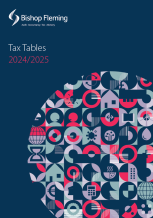Spring Budget 2024 tax and spend predictions
Updated: Download Bishop Fleming's full summary of all the announcements and analysis from the Spring Budget 2024 by clicking here.
What are we to make of the forthcoming Spring Budget on 6 March 2024? What will be in it and what are Labour's tax plans?
There has been so much media speculation about what may or may not be included in this pre-election fiscal event that it has become a media frenzy of conjecture and political manoeuvring.
First, we were led to believe that there would be a big cut in Income Tax following similar cuts in National Insurance, but then this market testing by The Treasury disappeared after it became clear that the financial headroom for such cuts had shrunk. Even the IMF appeared to warn against them.
But this is an election year and historically no government has wanted to go to the country without a offering a sprinkle of good news.
Whether the election is in May or November of this year, we have attempted to bring together all the key likely measures that Chancellor Jeremy Hunt may announce. Added to that, we have also examined what Labour may offer should they win the next election.
At the moment we have the highest tax burden for 70 years, inflation hovering around 4% and interest rates stabilised at 5.25%.
The Chancellor has to balance increasing spending commitments, including servicing interest payments on the public debt, against the revenue needed to pay for them. So the scope for reducing taxes is narrow.
And what of the Bank of England? How will it respond to the Spring Budget? Will it keep interest rates at their current level, or will it seek to reduce them if it feels that inflation is falling quickly enough (particularly due to falling energy prices) and pay settlements are lowering? The Chancellor has to anticipate the bank's response in framing his Budget.
What will be announced in the Spring Budget?
If we are to see announcements on tax cuts, it is widely expected that these will be in the areas of Income Tax, Inheritance Tax (IHT) and Stamp Duty. The 2023 Autumn Statement has already announced cuts in National Insurance Contributions from 6 January 2024 and 6 April 2024.
Could we see another reduction in employee NICs announced in the Budget? Maybe another 1p or 2p cut? The Chancellor is rumoured to be considering abolishing or scaling back the so called "non-dom" tax rules to pay for such a cut (more on this below), and even scrapping the tax rules for Furnished Holiday Lettings.
According to the Institute for Fiscal Studies, even taking into account this NIC cut, the overall level of taxation will increase by more over this parliament than under any previous parliament since records began in the 1950s. That is because of the freeze on tax thresholds, which have normally risen each year with inflation. But as they are frozen until 2028, the tax burden increases in real terms as inflation eats away at the thresholds.
There is speculation that the basic rate of Income Tax could be cut by as much as 2p, reducing the basic rate to 18%. Rishi Sunak has previously promised to reduce the rate by 1p, and this 1p cut now appears more likely (unless NIC is cut instead).
However, there are rumours of a rift between the Treasury and 10 Downing Street in that The Prime Minister would like to keep his promise of a cut in Income Tax, but as the Office for Budget Responsibility sees this as inflationary, the Treasury prefers to cut NICs.
Speculation also surrounds the scrapping of IHT, but we have seen messages in the media to the effect that this is just an aspiration, but there cut be a cut in the rate of IHT from its current 40% rate for estates worth more than £325,000. The rate, we are told, could be halved to just 20%.
As mentioned above, the "non-dom" tax rules could be scaled back by the Chancellor to steal a policy from Labour ahead of an election. These rules currently allow a foreigner living in the UK who is classified as having a non-UK domicile to avoid tax on their foreign income and gains, unless they bring (“remit”) the proceeds into the UK. That can continue for up to 15 years, even if they live in the UK for all of that time.
It has also been reported in The Times that Rishi Sunak’s advisors are discussing unveiling a 'five-year' tax-cutting plan, but that would depend on having the requisite finances and being able to form the next government.
It may be that the Chancellor is storing up good news for later in the year, possibly in a Conservative Party manifesto rather than in a spring fiscal event.
Fiscal drag
As pointed out above, one of the biggest issues for taxpayers has been the freezing of tax allowances until 2028, forcing via fiscal drag (inflation) more and more people to be paying tax for the first time or paying higher rates of tax.
One threshold that has remained unchanged is that of the High-income Child Benefit Charge (HICBC) which has caught out many taxpayers and looks unfair in the way it penalises couples. Increasing the threshold at which this bites would be welcome as it currently affects around 2.5m families.
According to media reports, freezing tax thresholds created an extra 3 million calls to HM Revenue & Customs in 2022/23 compared to the previous year due to people being dragged into the tax system. Freezing allowances, it appears, also puts pressure on HMRC as well as people's disposable income.
With inflation on a likely downward trend and hints of a possible Bank of England interest rate cut sometime this year, economic factors may give the Chancellor more room to manoeuvre on tax cuts, but he may decide to go further and uprate some tax thresholds to help low-income households and those who have been pushed into higher tax brackets.
Bolder measures?
The Chancellor is also under pressure from his own backbenchers to be much bolder in his measures and look at radical changes such as scrapping or reforming IR35 (the off-payroll rules) and maybe increasing the VAT registration threshold from its current £85,000.
No mention has been made of any possible changes to Capital Gains Tax, but there has been previous speculation of aligning CGT rates with those of Income Tax. But that would be an increase in the tax burden in an election year and so it is unlikely.
Business taxes
Back in 2007, Corporation tax was 30%, but by 2017 it had dropped to 19%. It was then raised again to 25% in April 2023 for profits above £250,000. It is likely that the Chancellor will now leave the rate as it is, but he may look to introduce further reliefs.
In April 2024 we will see the introduction of a single Research & Development tax relief regime and the making permanent of Full Expensing relief.
Whilst these policies were affirmed in the Autumn Statement, there could be changes in the details to make them more attractive for companies.
Other issues
A tax-cutting Spring Budget will put pressure on the Scottish government, which has proposed increasing Scottish Income Tax from April 2024. Will it have to reconsider its actions?
Following Brexit, the Government still has plenty of scope to change many EU rules which remain part of UK law, so the Chancellor may seek to relax some restrictions affecting certain industry sectors and financial services. VAT is ripe for post EU simplifications, should the Chancellor wish.
A new tax that is rumoured for the spring Budget is a vaping products tax to be paid on imports and manufacturers in order to make vaping less affordable. Many other EU countries have already introduced such a tax.
An extension of the fuel duty freeze is expected.
What will Labour do?
From an election perspective, how will Labour respond to the Spring Budget? If it were to form the next government, how will taxes change if it has a working majority in the House of Commons?
As this is a general election year and the polls are currently showing a significant lead for Labour, we cannot ignore what Labour is saying about its own tax and spend plans.
Shadow Chancellor, Rachel Reeves, has been making a series of announcements about what her party might do if they were to form the next government. She has stressed the importance of maintaining strict fiscal controls over tax and spending plans, but that is no different from previous Chancellors.
In media interviews and conference speeches she has made, the following policy announcements have emerged:
- There is no commitment to ending fiscal drag, and her plans are to maintain tax thresholds where they are.
- The 25% rate of Corporation Tax will be held in place until 2029
- Full Expensing and the Annual Investment Allowance will be maintained.
- There will be no cap on bankers' bonuses (something that bankers had already circumvented with higher salaries)
- Within six months of a Labour government, it has pledged to publish a “roadmap” for business taxation.
- It has also said it will close IHT exemptions for agricultural / farming land.
- And business relief may end which exempts shares in an unlisted company or a significant interest in a business.
- Scrapping or reducing business asset disposal relief is also on the cards, which allows people who own more than 5% of a company to sell their stake and pay a lower tax rate (even though this relief was introduced by Labour's Alistair Darling when Chancellor).
- Reducing the period from 15 years to 4 years that individuals coming to live in the UK can avoid tax on their foreign earnings (unless Jeremy Hunt does it first).
There is also a proposal to remove the VAT exemption from private school fees. The Institute for Fiscal Studies estimates that this would raise £1.6bn per year in extra tax (on current numbers attending private schools), but the cost of absorbing extra pupils into state schools as a result could cost between £100m to £300m per year.
Rachel Reeves has also pledged to reverse the abolition of the £1m pension lifetime tax-free limit on pension contributions, which Jeremy Hunt announced last year to stop consultants leaving the NHS as they were facing large tax bills. In seeking to reverse the abolition, Reeves has intimated that there could still be special treatment for doctors and maybe even senior public sector workers.
Labour's Green Prosperity Plan
On the much-advertised policy of spending £28bn a year on its Green Prosperity Plan to boost green industries (first announced in 2021), Rachel Reeves has now said that this is only an ambition and will depend on keeping within certain fiscal parameters. As time goes by, this particular policy appears to be put more and more on the back burner, particularly due to heightened media scrutiny.
According to The Times, Labour now only plans to borrow £2.6bn a year for net-zero investment and cover the balance through an extended windfall tax on oil and gas companies. But it still plans to create a state-owned energy company at a one-off cost of £8.3bn, and to decarbonise heavy industry via a £7.3bn national wealth fund.
Labour's Business Partnership
Labour has also published a Business Partnership paper that includes policies such as:
- One Budget every autumn, at least 4 months before the new tax year
- 10-year Research & Development budgets and a new Regulatory Innovation Office
- Apprenticeship Levy reforms to create a more flexible skills Levy.
- A New Deal for Working People that provides a living wage and bans zero hours contracts
Rail renationalisation
Shadow Transport Secretary, Louise Haig, has reiterated a policy first announced under Jeremy Corbyn that the rail networks will be renationalised as the private contracts of rail operators expire. This could mean that the operation of trains could be returned to public ownership within five years. No compensation will be offered to the rail companies, she has said.
Once an election is called, we will see more details on Labour's tax proposals in its manifesto.
Autumn Statement 2023
As a reminder, the Autumn Statement was on 22 November 2023.
Finance Act 2024
Draft Finance Bill 2023/24, based on the Autumn Statement, received Royal Assent on 22 February 2024.
There will be a new draft Finance Bill after the Spring Budget.
Further information
If you would like to discuss how these changes in tax policy may affect you and/or your business, please contact your usual Bishop Fleming advisor.
[Gary Mackley-Smith]










